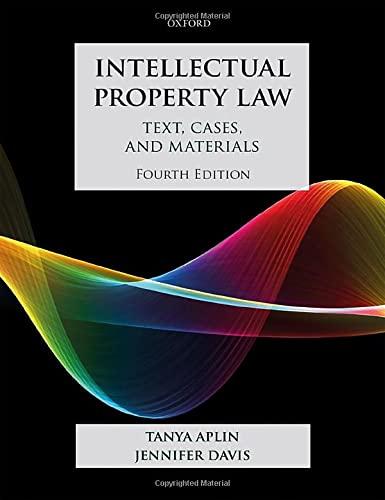Question
The government of Vince Land (fictitious state) in response to an increase in crime, related to weapons other than guns, introduced the Offensive Weapons Act
The government of Vince Land (fictitious state) in response to an increase in crime, related to weapons other than guns, introduced the Offensive Weapons Act 2019 ("OWA") (fictitious).
Mark was charged with an offence contrary to OWA. Section 2 of the OWA states that "It is an offence, triable on indictment, for a person to have in his possession, an unlawful weapon without lawful justification in a public place".
On December 5, Mark bought a mannequin from the store near his apartment building. Mark took the mannequin home and practiced very aggressive moves on the mannequin in the hallway of his apartment building and not in his room. During his practice session, Mark had in his possession a long sharp sword which he used to make stabbing motions at the mannequin. Residents of the complex, especially elderly Bob, were scared of Mark's actions. Bob called the police and Mark was arrested.
The Director of Public Prosecutions argues that Mark's actions fall within the definition of the offence under the OWA.
Mark tried to argue that the hallway of the apartment building is not a 'public place' within the meaning of the OWA as it is private property. Access is restricted to the apartment building by a gate accessible by a code, known only to residents of the apartment building.
Mark arrived at your law office a day before his court appearance showing you some research he found. It was the case Smith v Hughes [1960] 2 All ER 859, which considered the meaning of s. 1(1) of the Street Offences Act 1959. It is an offence under that Act for a prostitute to solicit in a 'street or public place'. The women were not actually in the street, but were inside their homes, tapping on their windows and calling to attract the attention of men. The women were found guilty. Mark wants to know how this case affect his case.
(a) You are a junior lawyer in a firm. The partner asked you, to critically explain, applying cases and scholarly works, the main approaches to statutory interpretation and 'whether judges make law under the guise of interpretation'.
(b) After reading your answer to question (a) above, the partner in the law firm has asked you to draft a response, applying cases and scholarly works, in relation to the above facts, advising Mark as to the likely interpretation of the OWA by a court.
Step by Step Solution
There are 3 Steps involved in it
Step: 1

Get Instant Access to Expert-Tailored Solutions
See step-by-step solutions with expert insights and AI powered tools for academic success
Step: 2

Step: 3

Ace Your Homework with AI
Get the answers you need in no time with our AI-driven, step-by-step assistance
Get Started


